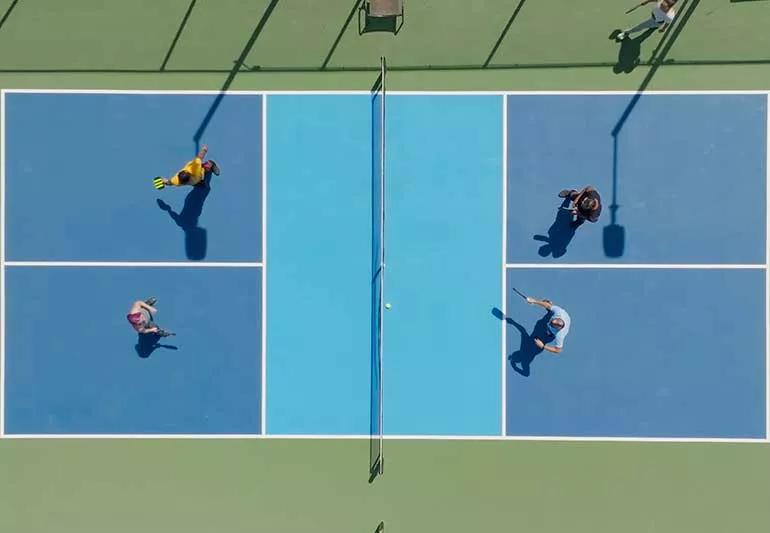With a little precaution, you can prevent injuries and stay in this good-for-you game

Image content: This image is available to view online.
View image online (https://assets.clevelandclinic.org/transform/cfc23652-10dc-4110-b66b-1e2e6f494407/Pickle-Ball-1412985102-770x533-1_jpg)
aerial view of doubles pickle ball match
If you’ve ”hit a dink shot into the kitchen,” you know the joy of pickleball. This booming sport is fast-paced, simple to learn and serves up lots of health benefits.
Advertisement
Cleveland Clinic is a non-profit academic medical center. Advertising on our site helps support our mission. We do not endorse non-Cleveland Clinic products or services. Policy
Padel, a paddle sport similar to pickleball, is another activity becoming popular around the world, especially in Spanish-speaking countries. But padel and pickleball have some differences, including the type of court, equipment and scoring system.
Pickleball is similar to tennis but has its own court, paddle, ball and rules. Most people find it more forgiving than tennis and easier to play. But even though it can be less impactful on your joints, it’s still a great workout, says physical therapist Jim Edwards, DPT. You need to move quickly and make rapid decisions.
“Advanced picklers are taking their play to the next level with tournaments across the U.S. and world,” Dr. Edwards adds.
Dr. Edwards shares more on how the sport of pickleball can boost your health and well-being.
“Pickleball appeals to people of all ages and experience levels,” says Dr. Edwards. “It’s a great sport for beginners who want to get more exercise.”
And the pickleball culture is welcoming, despite its competitiveness. The teams and leagues are a draw for those who want to meet new people.
These unique features can translate to a range of physical and mental health benefits for those who play regularly:
Current physical activity guidelines for adults recommend at least 150 minutes of moderate-intensity exercise per week. Moderate intensity means you’re at about 50% of your maximum effort.
Advertisement
Pickleball can help you meet these guidelines. One study of adults over the age of 50 found that more than 70% of their playing time was in the moderate to vigorous heart rate zone.
“When you play pickleball, your heart rate and breathing rate are up and you’re burning calories,” notes Dr. Edwards. “That translates to better heart health, lung health and weight management.”
Sports like pickleball stress your muscles and bones. Your body responds by making them stronger. Routine pickleball play can help you:
Balance is a key measure of being physically fit. Good balance reduces your risk of falls, a serious health threat to older adults. Exercise is one of the best ways to improve your balance.
To succeed at pickleball, you need to:
“These movements sharpen the connections between your body, brain and eyes,” explains Dr. Edwards. “Over time, you develop better balance and coordination.”
Exercise is not only good for your body — it also boosts brain health. The benefits of routine physical activity on your brain include:
“The social aspect of the game is also important,” says Dr. Edwards. “People interact with each other, enhancing their quality of life.”
According to a review of 13 studies on pickleball and mental health, players also report improvements in:
Research shows that exercise can help you live longer. One study of adults ages 40 to 85 found that a small increase in physical activity could reduce annual deaths. Adding just 10 more minutes of daily exercise could prevent 110,000 deaths each year.
Other studies link regular exercise to longer life expectancies. According to a recent report, the life expectancy of tennis players is nearly 10 years longer than people who don’t exercise. The researchers noted that activities involving more social interaction showed the greatest longevity effects.
Pickleball injuries have increased as the sport’s popularity has risen.
“This increase isn’t because pickleball is more dangerous than other fast-moving sports,” clarifies Dr. Edwards. “Rather, it’s due to more people playing.”
Advertisement
The most common pickleball injuries Edwards treats include:
Because of the quick steps, lunges, twists and arm swings, injuries typically affect players’:
You can prevent many pickleball injuries by taking precautions before and during play. Dr. Edwards recommends:
Advertisement
Are you ready to give pickleball a try? Check with your healthcare provider to make sure exercise is safe for you. If you’ve got the green light, look for a pickleball class for beginners, advises Dr. Edwards. A lesson before your first match can help you learn the game and proper form, which can help prevent injuries.
Pickleball can be competitive and intense. Start slowly and play with people at your skill level. Before you know it, you’ll be part of the pickleball wave that’s helping millions of people stay active and have fun.
Advertisement

Sign up for our Health Essentials emails for expert guidance on nutrition, fitness, sleep, skin care and more.
Learn more about our editorial process.
Advertisement
Goals that are specific, measurable, attainable, relevant and time-bound can support improvement in your health and wellness
Squats are foundational for building strength in your legs, glutes, quads and core muscles
A consistent walking program is an effective way to drop pounds and lose body fat
You can improve your athletic performance over time by breaking up your workout regimen into focused cycles
Lower-intensity workouts can deliver high-quality health and fitness results
Incremental changes in your exercise routine can improve your strength and endurance over time
Understanding heart rate zones can help you tailor your workout to reach your goals
Increase the size of your muscles by bulking up on protein and focusing on slow, intense movements with progressive overloading
Although it could be used as a moisturizer, this new trend is not recommended
Communicating clear limits helps protect your time, energy and emotional well-being
High cholesterol can be genetic, but testing and treatment can lower your heart disease risk